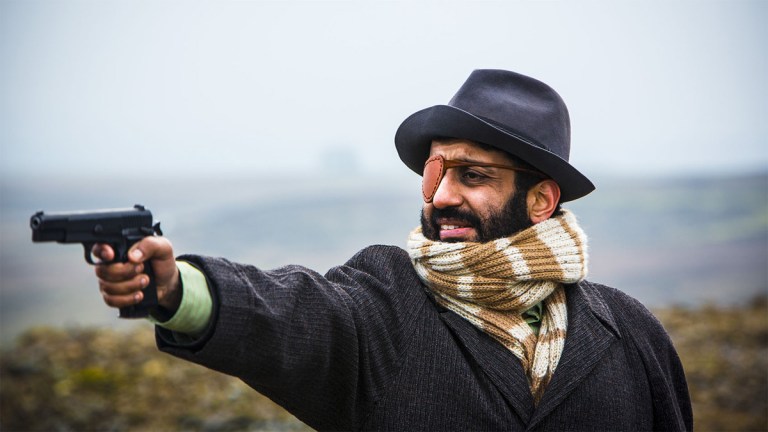Utopia Series 2 Episode 5 Review
This week’s Utopia takes a decidedly dark turn, and yes, that really is saying something…

This review contains spoilers.
Utopia’s world ends not with a whimper or a bang then, but with a burger chain employee handing in his hat…
This week’s instalment was a dark affair, no more violent than its predecessors, but much more tonally desolate. Up until now, Utopia’s present-day episodes have bounced along on a kind of bright, psychotic buoyancy. Terrible things have happened, but in close enough proximity to colour, action and humour that we’ve been too entertained to feel wretched about them. In this episode though, the exhilarating ride we were enjoying has shuddered uncomfortably to a halt, leaving us all dangling over a sheer bloody drop.
Framing the episode with stylised scenes of the man about to drop the Russian Flu bomb (Steven Robertson doing his best T-1000 impression) was an effective way to tidy up the edges of what was arguably this series’ most convoluted entry yet. With so many pieces in play at this stage of the game, it made narrative sense to divide up the group until the last scene, even if the numerous pairings and trios made things feel more chaotic than usual.
Before the chaos though, there was emotion. Episode five’s dolefulness began with Becky asking if they were all killers now, continued with Ian’s grief over the murder of his brother, and ended with the Carvels’ chaotic family reunion. We’re used to feeling shocked and delighted by Utopia, but pathos? That’s a new development. Well, new-ish, and entirely welcome.
Those eldritch moors were the perfect backdrop to the Carvels’ disconnected get-together, a heightened landscape against which their uncanniness fitted right in. When everyone had stopped pointing guns at everyone else for long enough to exchange words, we glimpsed some rare moments of parental love and sibling complicity between the Carvels. Philip loves Jessica, while Jessica and Arby had the closest two traumatised, psychotic killing machines can come to a normal conversation. Arby’s lost weight, his little sister noted approvingly. It must be the quinoa.
The Carvels may be demented but their interactions this week were eerily affecting – Jessica (not sterile, incidentally) was undone by her father’s love and moved by her brother’s attempt to protect her with that new identity (knowing it wasn’t for Arby poses the question of whether, like those sleeper agents, he was planning to to turn the gun on himself before his dad did the job for him?). Arby’s concern for Grant – pain in the arse though he is – and attempts to get through to his father’s Alzheimer’s-like flashes of lucidity were also emotionally involving.
Only Milner and Carvel’s reunion fell flat for me. Milner’s final act before her death – giving the go-ahead despite the new information – made absolute sense for a character whose life has been a parade of atrocity in pursuit of this one goal. What didn’t come off was why Carvel went over to Milner after she okayed his torture and that of the one person he loves most in the world. After years trying to bring Milner down, why would Carvel, even touched as he is, be on Milner’s side?
It wasn’t all grief, madness and murder though. There was a joke or three. Lee’s only appearance was blink-and-you’ll-miss-him, but he still managed to wedge in an “eye eye” gag at Wilson’s expense. Dugdale tucking that phone into his secret pocket provided a few nasty laughs. As did Becky’s Thoraxin-related nightmare of Marius pushing chips into the hole where his brains used to be. (If Utopia had a bigger audience, “Eat my fucking chip” would be trending and on t-shirts by the time the credits rolled).
The final irony of Philip Carvel’s work was revealed towards the end of the episode – not only did he construct a being who runs on violence in his attempt to eradicate it, but his ambition of stopping anything so abhorrent as the Holocaust happening again has simply recreated it in reverse. Instead of one ethnic group being hunted out of existence, everyone but that group will die. Thanks to Janus, the flu vaccine is a dud unless you’re one of the chosen Roma few. “This is all about family” said Arby last week, a line that’s creeping towards explaining this whole series. When Philip Carvel chose who to save, he chose his own family, pragmatism be damned.
What Utopia provokes us to ask ourselves is whether, faced with the same choice as Carvel, any of us would choose differently. As Jen Dugdale proved by interrupting that henchman’s monologue about them not being “that sort of people” with that knife, Utopia continually makes the point that the world isn’t divided into good and bad types, and that when our families are threatened and when we see no other choice, we’re all ‘that sort of people’.
